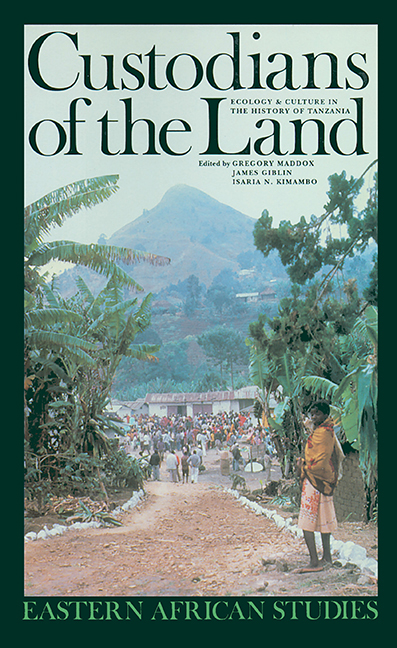Book contents
- Frontmatter
- Contents
- List of Maps, Figures & Tables
- List of Photographs
- Abbreviations
- Contributors
- Acknowledgements
- Introduction Custodians of the Land: Ecology & Culture in the History of Tanzania
- Part One Environmental & Demographic Change
- Part Two Environmental Change & Economic History: In Tanzania's Northern Highlands
- Part Three Politics & Environmental Change
- Part Four Environment & Morality
- Conclusion
- Bibliography
- Index
Introduction Custodians of the Land: Ecology & Culture in the History of Tanzania
Published online by Cambridge University Press: 30 August 2017
- Frontmatter
- Contents
- List of Maps, Figures & Tables
- List of Photographs
- Abbreviations
- Contributors
- Acknowledgements
- Introduction Custodians of the Land: Ecology & Culture in the History of Tanzania
- Part One Environmental & Demographic Change
- Part Two Environmental Change & Economic History: In Tanzania's Northern Highlands
- Part Three Politics & Environmental Change
- Part Four Environment & Morality
- Conclusion
- Bibliography
- Index
Summary
Environmental history and the scholarly and popular understanding of the Tanzanian past
In the essay which concludes this volume, one of the ‘founding fathers’ of Tanzanian history, Isaria Kimambo, reflects on the efforts of successive generations of historians to strike a balance between external causes of change and local initiative in their interpretations of Tanzanian history. He shows that nationalist and Marxist historians of Tanzania, understandably preoccupied through the first quartercentury of its postcolonial history with the impact of imperialism and capitalism on East Africa, tended to overlook the initiatives taken by rural societies to transform themselves. Yet there is good reason for historians to think about the causes of change and innovation in the rural communities of Tanzania, because farming and pastoral peoples have constantly changed as they adjusted to shifting environmental conditions. Short- and long-term climate change, calamitous droughts and excessive rains, exhaustion of soils and grazing, outbreaks of disease and infestations of crop pests have prompted East African communities to change their patterns of cropping, settlement and transhumance, their selection of seeds and cultigens, their management of vegetation and wildlife, their treatments of illness and their ways of thinking about good and evil. ’If we avoid assumptions about environmental equilibrium/ writes William Cronon, a historian of American environmental change, in a similar vein, ‘the instability of human relations with the environment can be used to explain both cultural and ecological transformations.’ In other words, once we begin to think about farming and pastoral societies inhabiting ever-changing environments, we are led to consider how economic institutions, political and gender relations, intellectual leadership and moral imperatives may have been involved in the process of environmental adaptation. This relationship between environment and rural culture, politics and economy is the subject of this volume.
Our interest in exploring the initiatives taken by rural communities in response to environmental change immediately brings us face to face with problems which surface not only in the narrowly academic domain of East African environmental and demographic history, but also in the modern political life of Tanzania.
- Type
- Chapter
- Information
- Custodians of the LandEcology and Culture in the History of Tanzania, pp. 1 - 14Publisher: Boydell & BrewerPrint publication year: 1996

